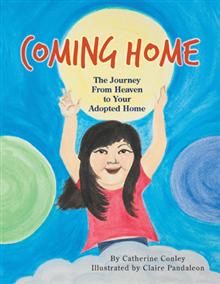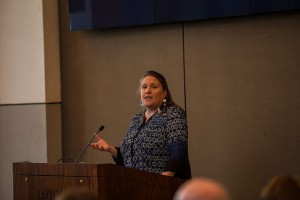Catherine Conley is a graduate of IPS and has recently authored a book that explores the circumstances and questions that surround adoption, especially in regards to her own daughter. She is currently a Global Consultant on issues of organizational learning and development, but her journey as an author began at IPS.
“My writing career began during my graduate studies at Loyola University’s Institute of Pastoral Studies in Chicago. I was introduced to the Hebrew writing tradition ‘midrash’. The translation of midrash varies from ‘to investigate’, ‘to study’, ‘searching out’, and ‘a story’… The first midrash I wrote was about the story of Jesus in the desert; alone, hungry, thirsty, and tired. He was about to begin a ministry that would change the world like nothing else in human history. My midrash attempted to answer the question; Why would he choose to go to a desert, a place of suffering and death to prepare? As a young graduate student living on a vibrant, dynamic urban campus his choice mystified me.”

Consultant Exec Transitions to Story Telling
Daughter’s Abandonment Inspires Story of Faith and Divinity
LAKE BLUFF, Ill. – It was late afternoon, September 18th, 2003. Catherine Conley was in her Chicago office on a conference call with her Beijing staff dealing with issues that were critical to her role running Asia operations for a global consulting firm. At the same time, the residents of Shaoyang City, China awoke to find a mysterious blue blanket on a nearby bridge. Wrapped inside was an abandoned baby girl, not even a day old. The convergence of these two events unfolded a year later, when Conley, her husband and son travelled to China and adopted this baby girl.
Engaging and thoughtful, Conley talks about how the adoption process was the beginning of a parallel career as an author. “’Where did I come from’ is a universal question that most children ask in their early years.” Conley says. “The answer to this question can be vastly more complex for adopted children”. “Coming Home: The Journey from Heaven to Your Adopted Home” (published by Balboa Press) addresses questions that Conley believes her daughter will someday ask about her birth circumstances.
Vividly illustrated by Claire Pandaleon, “Coming Home” tells the story of a journey from heaven to an adopted home. In a manner that is imaginative and profound, the book tells the story of why one child did not remain with her birth mother.
Circumspect in discussing the merging of careers – consulting executive and author – Conley says “for me, the answer to most of the challenging questions today – professionally and personally – are spiritual in nature. That means, ‘of our spirit’, ‘of our intuition’, ‘of inspiration’. There are a surprising number of executives who are ready to engage in this conversation. And, of course, some who are not. I can’t imagine it will be a conversation on CNBC’s ‘Squawk on the Street’ anytime soon.”
Laughing, Conley discloses her husband is in the latter group. “My husband is grounded in proof and reason. We have a 20 year plus conversation about the intersection of the world of Spirit and the physical world. Through her book, Conley connects spirituality and divinity with a story of abandonment and mystery.
It’s easy to see how Conley is able to bridge the cultural challenges one might typically face when running a business in Asia. Conley is articulate and gracious, easily inserting nuances of theology in stories of Board Room politics with Chinese executives. Throughout her book, Conley connects spirituality and divinity with a story of abandonment and mystery.
**The proceeds from “Coming Home” will be shared among three adoption charities; Gift of Adoption, The Adoption Center of Illinois at Family Resource Center and Half the Sky.
The Gorton Center in Lake Forest, IL will be the venue for a Book Launch and Signing Party on Thursday, July 16 @ 530pm
“Coming Home” By Catherine Conley Illustrated by Claire Pandaleon
Softcover | 8.5 x 11 in | 50 pages | ISBN 9781504327664
E-Book | 50 pages | ISBN 9781504327671
Join the conversation by following @BrianSchmisek on Twitter and @LoyolaIPS on Instagram! Also, network with the Loyola Chicago IPS community on LinkedIn.
